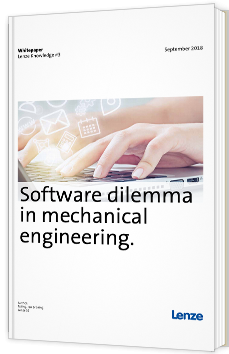

Dilemme logiciel en génie mécanique.

"The fourth industrial revolution is ushering in unrelenting changes for the mechanical engineering sector. These changes are presenting companies with various challenges, in particular when it comes to dealing with the rapidly increasing importance of software in their products, as this goes hand in hand with significant alterations in the requirements for their own development processes and the necessary expertise. Within companies, this leads to internal organisational and structural changes, which are often highly problematic due to the new types of challenges. There is therefore a need for ways and means of responding to this transformation in a domain that differs in many respects from the basic understanding of what mechanical engineering is. However, it is also important to remember that the digital revolution is primarily redefining business processes and market requirements – but not the basic foundations of business for medium-sized mechanical engineering companies.
Requirements of medium-sized mechanical engineering companies
For several years, mechanical engineering has been characterised by ever-shorter product life cycles and greater product customisation. The market thus presents mechanical engineering companies with various requirements that have an impact on the development process for their products and that the companies must master. Customers continue to demand shorter delivery and commissioning times. The reduction of batch sizes means that machines now need to enable much more flexibility in their use [1]. As a result, mechanical engineering companies must provide a greater degree of modularisation in their products. They must also further improve the productivity of their machines – in particular by minimising down time and set-up time. These growing demands on machines mean that systems are becoming ever more complex [2]. At the same time, users must be able to cope with the complexity of the machine with easy-to-operate user interfaces."